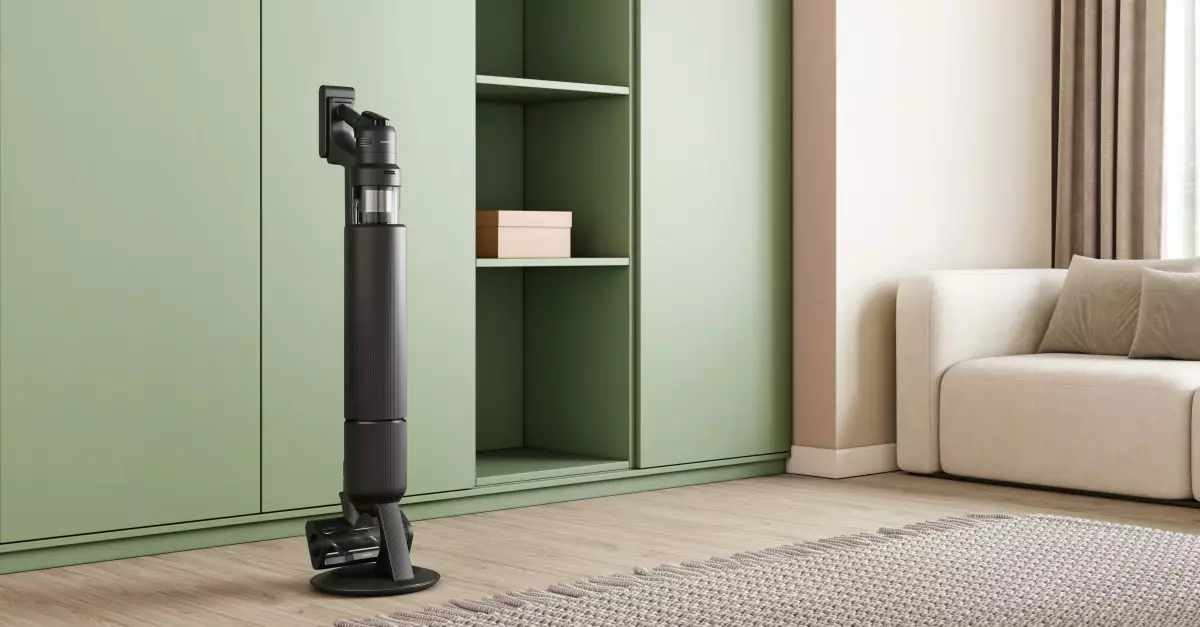The modern household is undergoing a transformation, propelled by technology that aims to enhance daily routines and improve our quality of life. Among these innovations, Samsung’s Bespoke AI line of home appliances is leading the charge. With the introduction of built-in LCD displays on devices like vacuums, washers, and dryers, our everyday chores are becoming smarter, more connected, and even capable of managing communication tasks typically reserved for our mobile devices.
Heading into the world of smart home technology can feel exhilarating, but it also raises the question: is convenience truly worth the potential drawbacks? Samsung is positioning its appliances not just as utility tools but as multifunctional devices that integrate seamlessly with our busy lives. The Bespoke AI Jet Ultra, for example, features a display that notifies users of incoming phone calls and messages. This is a noteworthy attempt to ensure that even during the most labor-intensive tasks—like vacuuming—you’re still connected to the outside world without the need to check your phone.
Beyond Cleaning: Smart Laundry Solutions
Samsung’s innovations extend into the realms of laundry with its new Bespoke AI Laundry Vented Combo washer and dryer. Priced at a hefty $3,099, this machine offers features that speak to the demands of modern living. Imagine starting a washing cycle, only to realize you’ve forgotten your detergent. This appliance not only dispenses detergent for you but also opens its door upon cycle completion. With the convenience of a 7-inch LCD touchscreen, answering calls while managing laundry is a game changer.
However, integrating such features into everyday appliances raises pertinent concerns. Are we becoming too reliant on technology? While these advancements can indeed save time and make life easier, there’s the underlying worry that we may inadvertently lose our manual connection with these essential tasks. Modern conveniences should support our lifestyles, not dominate them.
The SmartThings Ecosystem: Advantages and Drawbacks
Samsung’s broader vision encompasses its SmartThings platform, a central hub that connects all smart devices, including fridges that can help you manage recipes and even smart ovens that follow your culinary instructions. While it’s admirable to have an ecosystem that allows for inter-device communication, it also introduces complexity. The setup requires a Samsung account and is contingent upon the reliability of the SmartThings app. There’s a risk of dependency that can lead to frustration and disconnection, especially when technology does not perform as expected.
Moreover, integrating screens across all home appliances leaves one wondering about practicality and longevity. Touchscreens are inherently fragile; the potential for malfunctions is significant compared to simpler hardware options like knobs and buttons. As our appliances come to mirror our smart devices, we should question whether this “everything-all-at-once” approach is sustainable for future innovations or merely a passing trend.
Marketing Concerns: Ads and Data Privacy
Another point of contention concerns the advertising potential of these integrated screens. In a world where consumers are bombarded with ads online, having screens on every appliance raises alarms about potential ad placements directly in our homes. If Samsung or any other company were to monetize these interfaces, it could lead to intrusive experiences that detract from their primary function: to serve the user. This concern is amplified by the fact that many consumers are already wary of data privacy. Appliances capable of accessing the internet raise critical discussions about surveillance and information usage.
The prospect of emergent technologies like AI and machine learning certainly excites many in the tech community. However, integrating these technologies into our homes isn’t a flawless endeavor. A careful consideration of user experience must accompany each new feature introduced, especially if it encroaches on personal spaces where people seek efficiency and simplicity.
The Democratic Nature of Smart Appliances
Ultimately, the evolution toward flexible and interconnected appliances brings us to an important juncture. As these smart devices become more widespread, their role in our lives is set to expand. While there are undeniable benefits, it’s essential to remain cautious about the balance of technology in our homes. The ideal future blends sophisticated technology with intuitive design—a relationship where convenience serves to empower, not overwhelm.
Samsung’s advancements signal not just a push for smarter household chores but also an invitation to reflect on how connected living may redefine domestic life. It’s a new page in the book of modern living, one that invites both enthusiasm and critical discourse. The allure of technology beckons us, but caution remains wise; only by maintaining perspective can we ensure that progress enhances, rather than complicates, our daily experiences.

